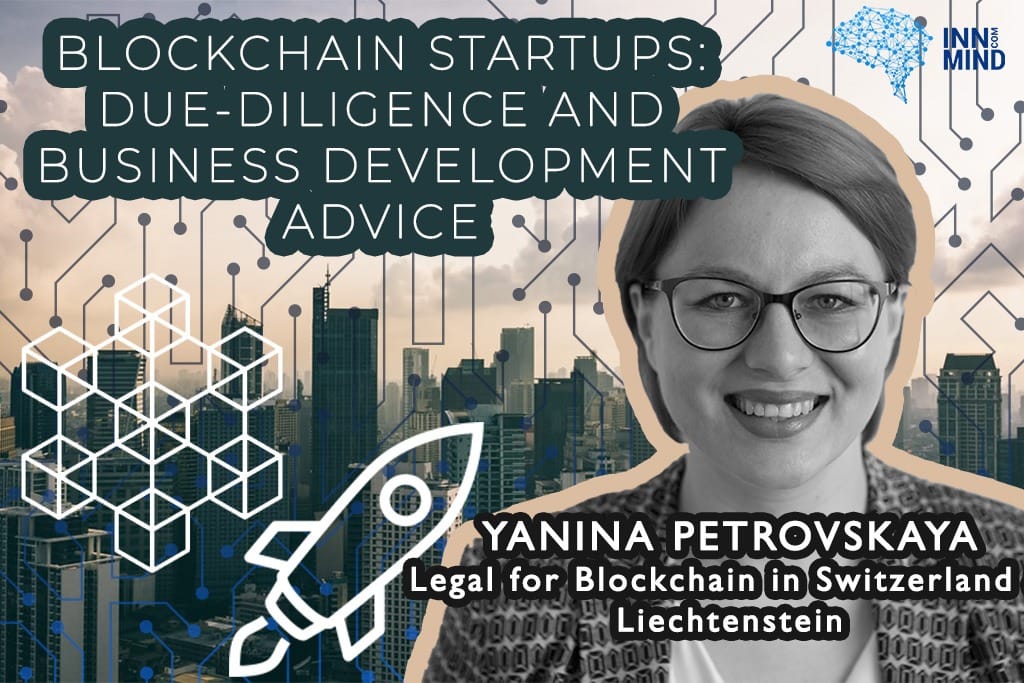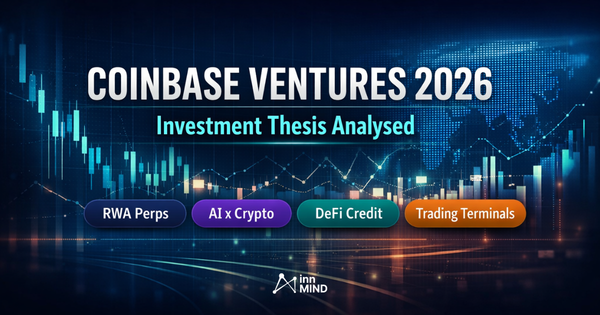Blockchain startups: due-diligence and legal aspects
Well-known lawyer from Liechtenstein and Crypto Valley answers questions about startup development, due-diligence and legal aspects

The hype around crypto and blockchain is gone, the industry becomes mature and we see many new startups in this sector who demonstrate a way more serious approach towards business development, than it was during ICO age. They focus on PoC and industrial pilots, make customer development and showcase business use cases, and many of them pay attention to delivering traction and proving unit economics before starting fundraising.
If this sector entered maturity stage, can we implement traditional venture techniques to assess blockchain and crypto startups? And what should investors consider while doing due-diligence on startups in this sector?
Anton Rodionov from InnMind team has interviewed a well-known legal & regulatory advisor in the crypto industry Yanina Petrovskaya.
Short bio:
Yanina Petrovskaya has an international consultancy background and used to advise international investors. She serves as a counsel in Rechtsanwälte Lennert Partners (Liechtenstein based attorneys at law), a tax law boutique that started supporting blockchain projects in Liechtenstein in 2017. She is also a regular speaker of Blockchain Leadership Summit, and co-author of the program for blockchain regulatory issues on crypto radio Satoshi.FM,
Why is startup due-diligence necessary before making investment decisions?
Due-diligence is necessary to understand the asset security for investors. The venture is always a high-risk investment, and if it is difficult to check it, then the chances of losing investments are very high.
What does the legal part of the startup due-diligence consist of?
From the legal side, IP rights are checked (clearly assigned and exclusive rights are desired). IP and team are usually the main assets of a startup. Further, tax structuring and the general jurisdiction of the company are checked. Investor rights should be protected well in the country where the target company is located.
What are the risks of investing in startups from developing countries? What should be done to balance risks and opportunities in venture investments?
Investment professionals recommend investing 70-80% of resources in a business with a traditional approach (lower-income products and highest ability of investment) and 10-30% invest in a business that gives you higher profitability but at the same time higher risks. So, normally investors don’t invest all their money in high-risk instruments.
In addition, developing countries don’t have a stable economy that means only a few emerging markets are able to make high profits within a short period of time but you have a risk of losing everything.
Investment companies and VCs invest money in developing countries but they make a deep analysis.
From a legal perspective, legal systems in developing countries do not also work well enough and it is one of the risks for investors.
Of course, developing countries attract investors but often these projects cannot provide what they promise that leads to investors’ exit from the project. In this case, investors should be protected with international and national law.
What country is the best for blockchain and crypto startups?
Switzerland and Liechtenstein are one of the best jurisdictions worldwide. Here is why:
Switzerland is attractive thanks for its specialized crypto and blockchain-related regulations or guidelines. Switzerland was one of the first countries in the world which introduced ICO guidelines defining Payment, Utility and Asset tokens.
In addition, FINMA has introduced a simplified license for fintech projects.
In general, many other factors make Switzerland competitive towards Malta, Estonia and other crypto-friendly countries:
- Stable economic and political situation;
- Well established protection of investors (due to well operating legal framework in the financial sector)
- Quite a low taxation and business-friendly state environment.
As FINMA in Switzerland, Financial Market Authority Liechtenstein (FMA) has also published ICO factsheet. In addition, one of the first in the world, Liechtenstein has already introduced the Blockchain Act. The Blockchain Act defines a token as an embodiment of rights, conditions for disposal over token and relationship: person, token and related assets.
Liechtenstein has almost the same advantages as Switzerland and even more:
- Firstly, Liechtenstein is a part of the European Economic Area and it allows you to reach the European market;
- Liechtenstein also protects its investors well that makes it more reliable than Estonia, Cayman Islands and other countries;
- Liberal legislation and legal stability as in Switzerland but faster and more flexible thanks to the size of the country;
- Liechtenstein is an international financial centre with over 295 billion assets under management.
In order to successfully launch a blockchain or fin-tech project in Switzerland and Liechtenstein, it is necessary to take into account the legal regulation of the country and fulfil the obligations of compliance. Here is where RL Partners helps startups, being specialized in national and international tax law with the focus on Switzerland, Germany, Liechtenstein, USA, Russia & CIS.
How to divide the company?
It is good when a company is sliced between founders, staff and others and these people have an adequate proportion to influence the company.
I don’t recommend dividing the company 50x50 between founders. In this case, some issues can appear when you cannot make any decisions without the CEO or director and the company gets clogged.
So, the startup should find the expert who helps the founders slice the company regarding the situation.
In addition, Intellectual Property is a very important thing. IP should be taken into account to protect founders and investors in the worst scenario.
Lawyers are usually needed in deadlock, urgent or force majeure situations. How to avoid these situations?
Lawyers just try to find risks and overcome them with legal methods.
A startup can have a lawyer from the very beginning to avoid some situations but not all startups can do it. So, startups should “observe prevention”. I can compare it with that in 30-35 you need to live a healthy lifestyle if you have a risk to die in 60.
When does it make sense to move crypto finance business to another country?
Opening the company in a certain country is needed when you will work with that market. If you want to target investors in the European Union it is essential to have a company in the EU. Remember the rule: if you have customers here - you have investors here.
In addition, investors trust the country where they live and spend their money and it can be the next reason to move to another country.
You can also watch the full video interview with Yanina.
Hope this interview gave pieces of advice to make important decisions and develop your business. If you still have any questions or need support, feel free to apply for a free consultation with InnMind experts about due diligence and business development.
Read also:









